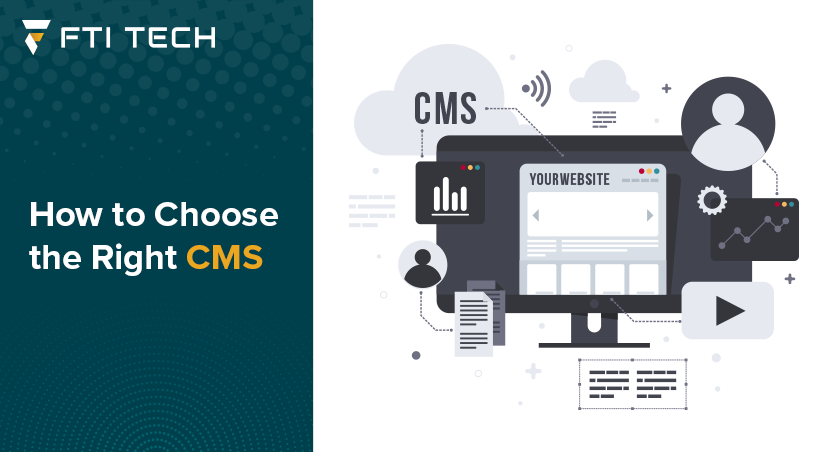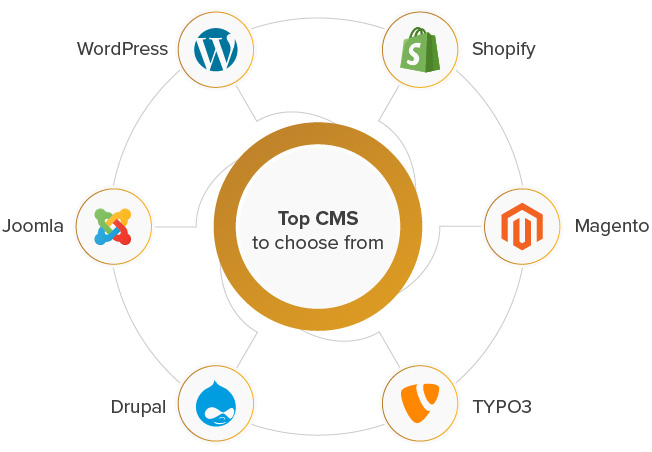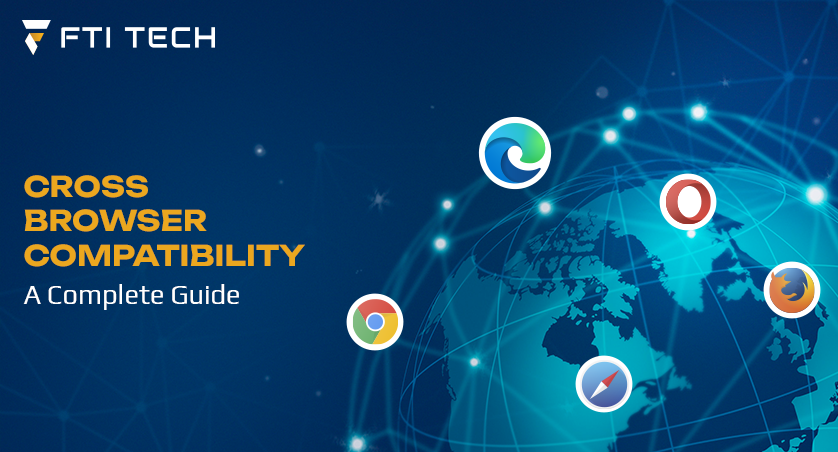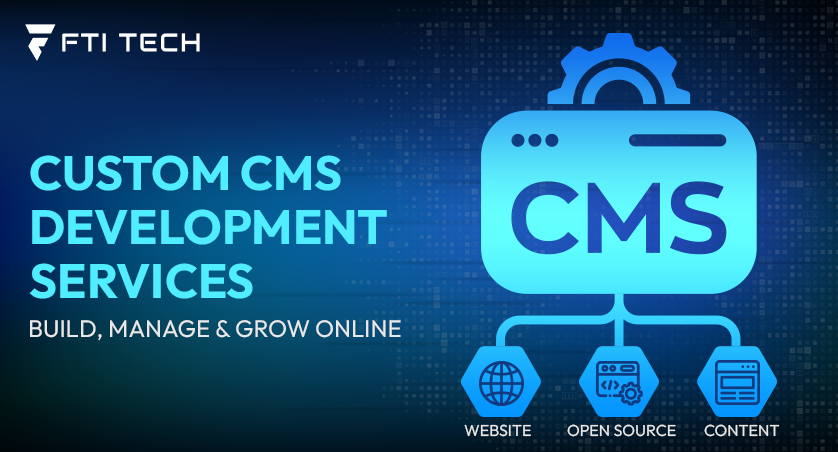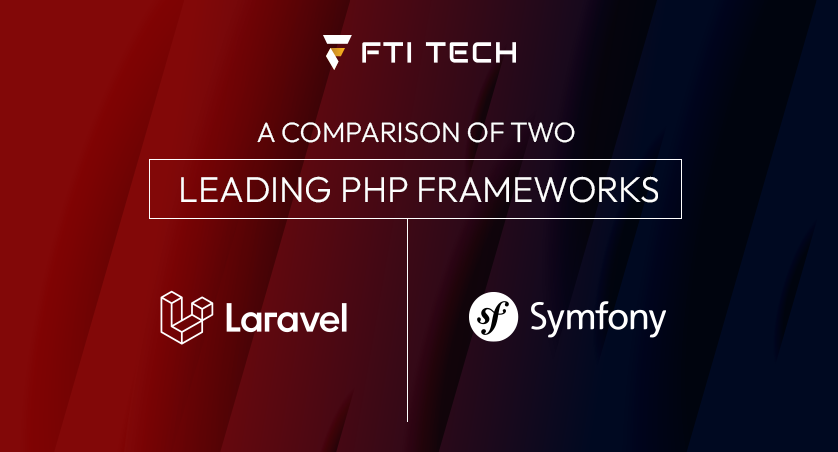How to Choose the Right CMS: A Definitive Guide
Introduction
A website is one of the most basic things every business does in the current digital era. However, businesses are confused about finding the best content management system (CMS) for website development. While some CMS has many website development features, they may not fit within the budget. Other CMS are free and open-source but do not offer the necessary functionality.
More than browsing through the list of CMS, understanding the features and alignment with your needs is important. You must compare each option based on cost, features, and customization features. But before you choose the best CMS for a website, your mind will have a cognitive tickle asking why it is important.
Answer is straightforward. There are more than 1.13 billion websites on the internet. So, if you want your website to rank higher and compete against competitors, managing the content and ensuring enhanced user experience becomes crucial.
This is where a CMS can help you edit, upload, and do other content management activities. The article will help you understand what CMS is and provide a comprehensive understanding of the factors to consider. But first, here is the answer to your first question!
What is a Content Management System (CMS)?
Content Management System or CMS is a software program that enables you to create, manage, and change content on a website without enough technical knowledge.
It allows you to build websites even if you don’t know how to code. Some CMS are drag-and-drop types that do not require coding knowledge, while others, like WordPress, need some coding prowess. Another critical aspect of CMS is the difference between headless and traditional CMS.
What is a headless CMS?
Headless CMS is a content management system that divides the location of content presentation (the head) from content storage (the body). In this CMS, information and presentation are kept separate. This allows content remixing and reuse across digital media platforms such as mobile and online.
So, why is this separation necessary?
A headless CMS enables you to make central changes to the content and deploy it on any digital platform. But if your front end and back end are coupled, making the changes can be complex. This is where the separation of the front and back ends comes into play. Using headless CMS, you can make changes to the content without affecting the user experience, automating and managing the modifications at scale.
So, is headless CMS better than traditional CMS?
Here is the answer!
Traditional CMS Vs. Headless CMS
Traditional CMS is a software program that allows you to manage content but it affects the view part of your website. So, if you make changes in the backend it affects the front end directly disrupting the website experience.
At the same time a headless CMS is another software program that allows you to manage content without disrupting the website experience. The frontend and backend in an headless CMS are not coupled allowing you to manage content easily without affecting the web experience.
Traditional CMS has the content management part coupled with the frontend layer. This means managing the content at the backend can become complex. It allows you to create, organize, and publish content on the website; however, what makes headless CMS more attractive is the ability to perform all the activities independently of the front end.
In a monolithic structure of traditional CMS, the backend and frontend are tightly coupled, meaning changing or altering the content can directly affect the website experience. If you are adding a new feature or functionality, it becomes difficult in a traditional CMS where content is an immutable asset.
At the same time, in headless CMS, you can easily change content without affecting the web experience.
How to choose the right CMS – Factors to consider
You may decide on either a headless CMS or a traditional one, but still, with a crowded market offering several options, the question is, “how to choose the right cms?”
There are many factors to consider before choosing a CMS. But instead of browsing through a list of CMS first, you need to understand these factors.
Choosing a CMS is a big decision, so you must have all the factors like cost, ease of use, SEO friendliness, and personalization.
-
Cost of CMS
First, you should consider your CMS budget, including licensing, implementation, updates, upgrades, and optimization, before choosing the CMS. Further, you need to make sure the CMS you choose aligns with the key requirements of your business.
For example, if you choose a CMS for optimal budget but compromise on the features your business requires, it will impact the final quality of your website. There are many examples of CMS that provide free access to content management but have limited features.
So, if you are looking for advanced capabilities, you need to go for paid CMS with tools and functionalities that make content management easier.
-
Business needs
Striking a balance between what you need and what meets the exact requirements can be complex. However, if you want to overcome this scenario, the best way is to choose a CMS that caters to all business needs.
Here are some key aspects to consider:
- Does CMS allow you to make changes to the website without technical knowledge?
- Allows permissions for editing specific parts of the site
- Provides a version control process that has backward compatibility
- Includes a staging view for the website before going live
- Allows you to upload videos and images easily
- Facilitates creation of multiple pages with ease of navigation
- Provides ease of integrating any external service or app to the website.
For example, you can choose WordPress if you have some technical knowledge. On the contrary, Wix does not require much technical knowledge, and your teams can easily add new pages through the site editor.
-
Tech stack and programming languages
A major factor to consider while you choose the best CMS for website development is to analyze which technologies it uses at the core. Your team may be using a specific tech stack and will be well-versed with specific programming languages.
This is why you need to choose the CMS that is compatible with the existing tech stack, and programming languages that your team uses. For example, if your team already uses a database like MySQL or PostgreSQL, Drupal supports it.
Similarly, you can choose from different types of CMS based on specific tech stack and programming language compatibility.
-
Customization
Customizing your website is crucial to providing a more personalized experience. This is why if you are selecting a CMS it becomes necessary that you compare customization features. For example, WordPress allows you to customize your website through plugins and themes.
On the other hand, Joomla comes with extensions that allow you to customize your websites. Both offer customizations but with WordPress, you can develop your custom plugins which allow you to maintain uniformity across the site and cater to the specific needs of business.
-
SEO-friendliness
CMS needs to be SEO-friendly, and it’s obvious right? Because, as a business, you need more visibility. So higher the website rankings, the better the chances of customers discovering it.
When you consider SEO-friendly CMS, there are many options, but each has some drawbacks too. For example, WordPress offers the best SEO-friendly features, but you need to integrate plugins for it.
At the same time, Drupal comes with mobile-friendly themes, elevating your search engine rankings. But lacks SEO features out of the box. On the contrary, Joomla has SEO extensions that help you edit meta information and enhance sitemaps for better SEO.
Now that you know what to consider before choosing a CMS, here are some options to choose from.
Top 6 CMS to choose from
-
WordPress
WordPress is one of the top CMS and powers more than 43.2% of all the websites on the internet. It offers several plugins and themes for the customization of your website. Choosing WordPress development can be fruitful if you already have some coding knowledge.
WordPress Market Size (2023-2024) WordPress has 62.5% of CMS market share globally and is expected to grow further in coming years Features WordPress is easy to use, flexible, and extensible. It offers thousands of customizable themes and plugins, as well as a supportive community, a built-in SEO system, and a media-friendly content editor. Ideal for WordPress is a user-friendly CMS for creating websites, suitable for beginners and experts alike. When you should use Choose WordPress for a versatile and user-friendly CMS. Benefit from its large ecosystem of themes, plugins, and resources. - Joomla
Joomla is the other most popular CMS, powering around 1.8% of all websites on the internet. It is an open-source CMS that allows users to build websites and offers a mobile-ready platform. Choosing Joomla development can help you customize your site better with thousands of pre-built extensions.Joomla Market Size (2023-2024) Joomla has 2.5% of CMS market share globally. Features Joomla has a multilingual system, access control, media, banner, contact, and web link managers. It supports extensions and templates to enhance functionality and design. Ideal for Joomla is for experienced users who want more control over their websites. It’s ideal for complex websites like e-commerce, social networking, community, and education sites. When you should use It is ideal if you seek to use its purpose-built extensions and templates. -
Drupal
Drupal is the sixth most popular CMS, powering around 1.2% of all websites on the internet. Drupal development allows for highly customizable user interfaces with advanced user management and multilingual support.
It has a sophisticated user role classification and permissions system, built-in SEO, and a media-friendly content editor.
Drupal Market Size (2023-2024) Drupal has a 1.5% CMS market share, with a niche user base among high-traffic and enterprise websites. Features Drupal is a secure and flexible CMS. Its modular system allows you to add/remove features. It has taxonomy, content revision, content type, user role, and configuration management systems. Drupal also supports themes and modules. Ideal for It is suitable for large-scale, data-driven, and mission-critical websites that need high performance and security. When you should use Choose Drupal if you have the skills and resources for a highly customized website with advanced functionality. -
TYPO3
TYPO3 is an open-source content management system for creating and managing websites of any size. Ideal for businesses that require a flexible, scalable, secure platform with a large support community. Using TYPO3 development, you can create high-quality websites for your business.
TYPO3 Market Size (2023-2024) TYPO3 is the ninth most popular CMS, powering around 0.7% of all websites on the internet and holding 1.1% of the CMS market share globally Features TYPO3 has a modular system that allows you to add and remove functionality as needed. It also has a rich text editor, a file manager, a media manager, a form builder, a workflow engine, and a multilingual system, and a granular access control. Ideal for It is suitable for websites with complex content structures, multiple editors, and high-security standards. When you should use You should use TYPO3 if you want a CMS that can handle any website you want to create, from simple to enterprise-level. -
Magento
Magento is an open-source e-commerce platform enabling businesses to build and manage online stores easily. It is ideal for enterprise-level companies and users who want complete control and customization over their websites. Magento development offers a module-based architecture to expand functionalities for your online stores.
Magento Market Size (2023-2024) Magento is the fourth most popular ecommerce platform holding 2.34% of the ecommerce market share globally. Features Magento has a module-based architecture that allows you to expand your ecommerce store’s functionalities. It also has a catalog management system, a shopping cart system, a checkout system, a payment system, a shipping system, a marketing system, a customer service system, and a reporting system. Ideal for Magento is ideal for enterprise-level companies and users wanting complete website control and customization. When you should use You should use Magento if you need an ecommerce platform that can handle large-scale and sophisticated online stores. - Shopify
Shopify is an all-in-one e-commerce platform for businesses of any size. It allows users to build an online store, market to customers, and accept payments. Shopify development offers the benefit of themes, apps, and features to help businesses succeed online.Shopify Market Size (2023-2024) Shopify is the second most popular ecommerce platform. There are over 4.6 billion eCommerce sites that are built with Shopify. As of the second quarter of 2023, Shopify has a market capitalization of 74.09 billion. Features Shopify offers businesses a one-stop solution to build online stores, market their products, accept payments, and manage their operations. It provides a user-friendly dashboard system to manage products, orders, payments, shipping, marketing, customer service, and analytics. Ideal for Shopify is ideal for small to medium-sized businesses and beginners who want a simple, easy-to-use solution. When you should use You should use Shopify if you want an ecommerce platform that can help you launch and grow your online store quickly and easily.
Which CMS to consider?
When it comes to choosing the right CMS, you need to consider many variables. However, what makes a good CMS for your website is the perfect blend of alignment with your business needs, cost, and features. So, the best practice will be to compare the entire list of CMS based on different parameters and finalize a few.
You can leverage the free trial from different CMS to understand the ease of usage experience and whether it aligns with your requirements. Further, you can look at the examples of CMS usage in the industry and examine the peer reviews for better comparison.
Conclusion
Choosing the right CMS for your website is a critical decision that can impact your online presence. You need to consider factors such as your needs, budget, technical expertise, and desired features before selecting the best CMS for website development.
Whether you choose a popular option like WordPress or a more specialized one like TYPO3, there are many powerful CMSs available to meet your needs and help you create a successful website. However, which one to choose will depend on specific business requirements.
